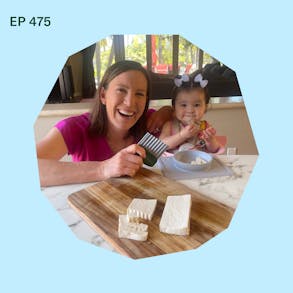Fermented Foods: Can Babies Safely Eat Fermented Foods?
- What fermented foods are and the process for achieving fermentation (...without a ton of salt options too!)
- Potential health benefits of fermented foods in the weaning diet and food safety precautions when offering fermented foods to babies
- How cultures around the world utilize fermented foods in the weaning diet
- Kim, Binna et al. “A Review of Fermented Foods with Beneficial Effects on Brain and Cognitive Function.” Preventive nutrition and food science vol. 21,4 (2016): 297-309. doi:10.3746/pnf.2016.21.4.297
- Olayanju, Adetokunbo et al. “The efficacy of fermented foods in the treatment and management of diarrhoeal diseases: A systematic review and meta-analysis.” Nutrition and health, 2601060221095678. 28 Apr. 2022, doi:10.1177/02601060221095678
- Kiousi, Despoina Eugenia et al. “The Clash of Microbiomes: From the Food Matrix to the Host Gut.” Microorganisms vol. 10,1 116. 6 Jan. 2022, doi:10.3390/microorganisms10010116

LISTEN TO THIS EPISODE
Can babies safely eat fermented foods? Fermenting foods is one of the world’s oldest methods of preserving foods, with some pretty legit potential health benefits. In this episode we’re looking at what types of fermented foods babies can eat and why you might want to consider these, along with precautions for offering babies fermented foods too.
SUMMARY OF EPISODE
In this episode we’re talking about:
What fermented foods are and the process for achieving fermentation (...without a ton of salt options too!)
Potential health benefits of fermented foods in the weaning diet and food safety precautions when offering fermented foods to babies
How cultures around the world utilize fermented foods in the weaning diet
RESEARCH LINKS from episode
Journal of Pediatrics and Pediatric Medicine - Fermented Foods Guidelines for Children
Kim, Binna et al. “A Review of Fermented Foods with Beneficial Effects on Brain and Cognitive Function.” Preventive nutrition and food science vol. 21,4 (2016): 297-309. doi:10.3746/pnf.2016.21.4.297
Olayanju, Adetokunbo et al. “The efficacy of fermented foods in the treatment and management of diarrhoeal diseases: A systematic review and meta-analysis.” Nutrition and health, 2601060221095678. 28 Apr. 2022, doi:10.1177/02601060221095678
Fermentation : assessment and research : report of a Joint FAO/WHO Workshop on Fermentation as a Household Technology to Improve Food Safety, in collaboration with the Department of Health, Republic of South Africa, Pretoria, South Africa, 11-15 Dec. 1995 https://www.who.int/publications/i/item/WHO-FNU-FOS-96.1
Kiousi, Despoina Eugenia et al. “The Clash of Microbiomes: From the Food Matrix to the Host Gut.” Microorganisms vol. 10,1 116. 6 Jan. 2022, doi:10.3390/microorganisms10010116
Cooking Light lower sodium sauerkraut recipe: https://www.cookinglight.com/recipes/fermenting-home-made-sauerkraut
World Health Organization, Botulism: https://www.who.int/news-room/fact-sheets/detail/botulism
EPISODES mentioned in this episode
Episode 202 - Gut Check: Microbiome and Food Allergy Development with Liam O'Mahony, PhD
Episode 108 - Probiotics: Should Your Baby Be Taking Probiotics? with James Marin, RD, EN and Dahlia Marin, RDN, LD
TRANSCRIPT OF EPISODE
WANT MORE BLW INFO?!
SUBSCRIBE to the BABY-LED WEANING MADE EASY PODCAST - new episodes are released on Monday and Thursday and subscribing means you’ll never miss what’s new (+ you’ll get notified about special bonus episodes too!)...subscribe here.
Grab my free download called BLW + DAYCARE: How to be a Baby-Led Weaning Advocate at Daycare - sometimes just getting the confidence to get going will help you realize your baby CAN and WANTS to do this self-feeding thing! < < CLICK HERE FOR THE BLW DAYCARE FOODS DOWNLOAD > >
REGISTER for my free online workshop BABY-LED WEANING FOR BEGINNERS: How to get your baby to try 100 foods before turning 1 without you having to spoon-feed purees or buy pouches. Everyone on the workshop gets a copy of my 100 FIRST FOODS list so you’ll know exactly what foods babies CAN eat when they’re ready for BLW! Register for this week’s workshop times here.

Latest Episodes






Katie Ferraro (1s):
Quick pulse check. Are you feeling okay about baby-led weaning, a little nervous about this transition? Are you maybe interested in BLW but not entirely sure if this is the approach for you, or maybe you started baby-led weaning, but you're feeling stuck or you're gonna give up, because you're not sure if you're doing this right. Don't give up. I have a brand new one hour comprehensive online video training for you called Baby-Led Weaning for BEGINNERS. It's totally free. And I think it it's gonna ease a lot of anxiety for you. I just redid this free training. It's packed with videos and visuals on how to safely prepare BLW foods and what the first few days looks like and how to reduce choking risk. Plus everyone on this free workshop gets a copy of my 100 First Foods list.
Katie Ferraro (41s):
So you'll never run out of ideas about what to feed your baby, next. You can get signed up for this weeks video workshop times at babyledweaning.co. If you you've got one hour to dedicate to learning about BLW, this is the training for you. Babyledweaning.co has this week workshop times. And don't forget, you also get that 100 First Foods list from this free training. And I hope to see you there. So when you think about traditional fermented foods, let's think of sauerkraut. For example, the first thing that come to mind is like, yeah, it's a great way to make cabbage soft, but it also involves so much sodium, but you can actually modify even homemade sauerkraut to make lower salt versions so a baby can have this fermented foods safely. Hey, there I'm Katie Ferraro, Registered Dietitian, college nutrition professor and mom of seven specializing in baby-led weaning here on the Baby-Led Weaning Made Easy Podcast.
Katie Ferraro (1m 28s):
I help you strip out all of the noise and nonsense about feeding, leaving you with the confidence and knowledge you need to give your baby a safe start to solid foods using baby-led weaning. Hey guys, welcome back! Today, we're talking about fermented foods and can babies safely eat fermented foods? We'll talk a little bit about what those foods are, what the potential health benefits are, any safety concerns, drawbacks, and then what foods under the fermented foods umbrellas, you know, your baby might benefit from eating. Now. I like to start each of these mini baby-led weaning training episodes with a quick story, and today's story is just that I basically went down the biggest rabbit hole on fermented foods in the weaning diet of different cultures around the world.
Katie Ferraro (2m 11s):
I, I don't do this very often, but I felt like it was back in like public health school and reading these, really old World Health Organization documents from the mid 1990s. But it's fascinating how other cultures utilize this food preservation method and have for decades and generations, and sometimes fermented foods kind of get this like hippy dippy, crunchy kind of alternative medicine vibe, I guess is the only way I can describe it. But yet this is actually one of the oldest technologies used for food preservation. It's an incredibly affordable technology and fermented foods have been used in parts of the world where historically refrigeration and other food preservation methods were not available. So, let's talk a little bit about fermented foods, what they are again, who's used them historically, some ideas and lists of fermented foods and then how you you might incorporate them in your baby's weaning diet, If you are so inclined, and than what to look out for.
Katie Ferraro (3m 4s):
So with no further adieu, "Fermented Foods and can Babies Safely Eat Them?" so, as I mentioned, fermented foods, one of the oldest technologies used for food preservation. Okay. And this is the biochemical modification of food products brought about by microorganisms and their enzymes. Okay. And why might you ferment a food? Well, historically from a food safety standpoint to make certain perishable items last for a longer period than they might otherwise have lasted when you don't have refrigeration or other food preservation methods. So fermentation has been used to enhance properties like taste of foods, aroma, shelf life, texture, nutritional value. And when we're looking at fermentation on the whole, it's generally at the household level, lactic acid fermentation, this natural process that's brought about by the lactic acid that's already present in the raw foods, or you might have it derived from a starter culture.
Katie Ferraro (3m 58s):
And we'll talk about some of the different examples of this around the world, but in these like old school World Health Organization reports like so old that they were like photocopies of like really old printed word documents. It looked like, So you couldn't search anything. So I had to read them, but like I really enjoyed just reading about some of the different cultures around the world. For example, in Tanzania, these yeast that are used to help ferment certain root vegetables. So for example, cassava or manioc, this is a food staple for people in many developing countries, particularly in most parts of Africa, a very energy dense root crop. That is a, you know, bitter food that could be potentially toxic because of cyanide content.
Katie Ferraro (4m 39s):
But If you ferment that cassava, it becomes a product that's not only safe to eat, but again, energy dense and it's a product that's generally introduced in certain parts of Africa to children, usually after age one and then becomes a major part of the diet. So I was kind of interested obviously in the six to 12 month period, as you can imagine, there's not a ton of research that's out there on the benefits or safety or efficacy of these foods, but I just kinda wanted to talk through this idea of fermented foods. So I mentioned particularly in Africa, fermentation of certain foods like in Tanzania making, for example, a fermented beverage, which, you know, a lot of alcohol beverage alcohol is essentially a product of fermentation. We've gotta avoid the alcohol production.
Katie Ferraro (5m 21s):
Of course, some of the undesirable gassiness that can occur. There's some modifications we need to make for infants, but in other parts of the world, for example, meat and wheat and dairy food products have been fermented for generations using lactic acid, bacteria and molds, and yeasts performed all over the world, Europe, Australia, and North America, South America, people in the African continent generally are fermenting root vegetables and milk in Asia populations tend to ferment vegetables like soybeans and rice and fish as well as substrates for the production of lots of different alcoholic beverages like sake. And then, you know, condiments such as fish sauces. Other parts of the world have used it as I mentioned for preserving foods. Okay. So it's customary in certain African countries to give infants fermented rice cereals or root crop products.
Katie Ferraro (6m 6s):
These are alternatives to again, not having the conventional methods of food preservation, like cold storage or alternatively dehydration or canning, etc. So prior to refrigeration, this was one of the few ways to preserve food. And we're thinking about foods in case you're like not familiar with, you know, different fermented foods, cheese and yogurt, sauerkraut, kimchi, olives, salami, jerky, even certain types of bread, beverages like wine and beer. Okay. Obviously coffee, hot chocolate. These are all examples of fermented foods, some of which are more appropriate for infants than others. And the process is simply when you ferment the foods, the natural bacteria and those foods like let's take vegetables, for example, they break down the compounds of those vegetables. It actually makes forms that are a little bit easier to digest.
Katie Ferraro (6m 47s):
So, in that regard, we might be interested in their benefits for infant nutrition. There's two types of fermentation. You can either do it through a brine, okay. Which is, of course, often higher in salt. And so one of the primary limitations of offering infants fermented foods is the concern about salt, right? If you've been learning about baby-led weaning or infant feeding or listening to the podcast for any length of time, you know, that we avoid adding salt. So it doesn't mean that all fermented foods are off limits, but certainly those heavily salted, brinded ones would be less desirable because we don't want babies to be exposed to high levels of excess sodium. So in order to reduce sodium, you can opt for the other option there; fermented foods created through the culture process.
Katie Ferraro (7m 28s):
So things like yogurt or kefir, sourdough bread, if you're ready to tackle breads, even fermented coconut water, once the baby starts consuming more fluids outside of infant milk, we of course don't want to displace that all nutritious breast milk or infant formula that provides the majority of baby's nutrition, especially early on in baby-led weaning. So, what sort of foods are fermented list of foods that might work for baby-led weaning? Kefire is one that's mentioned quite regularly. So kefir is a drink made from fermented cows milk or goats milk or sheeps milk, has kind of a sour taste. So we'll look at some of the benefits of including fermented foods in the infant diet to some degree and the introduction of sour foods.
Katie Ferraro (8m 10s):
You know, there's not a ton of foods under the sour food umbrella, but we want to expose baby to a variety of foods and flavors and tastes and textures. And so kefir, you can get whole milk. I was just looking up like examples, like just something you could order on Amazon, right? An organic kefir from Amazon, that's a full fat milk. So made out of whole milk, right, because we don't do reduced fat milk products for babies. It's kind of like If you don't find a lot of people, don't love the taste of regular greek yogurt or regular yogurt, it's a little sour, but the kefir taste would be kind of like a drinkable yogurt that's a little bit on the sour side. Fermented sweet potatoes is another example. Applesauce to some degree can be fermented and still safe for babies to eat. Sauerkraut is one that comes to mind.
Katie Ferraro (8m 51s):
I know we had a German au pair who lived with our family for two years, Julia, and she was just recently back visiting and she was like, "where's the sauerkraut!" and I had to go out and get sauerkraut. I forgot she loved to have sauerkraut. I actually found, and people have asked a lot about cabbage. I actually do not have cabbage listed on my 100 First Foods list. Sauerkraut is a way to make cabbage soft. However, generally due to the high quantities of sodium in commercial sauerkraut, it's not a food that I've traditionally fed, but I was in my rabbit hole that I went down for preparation on this episode, I found this like, another old school recipe, like from the Cooking Light days, a salt free sauerkraut recipe from Cooking Light. So If you are like, you are really experimental in your kitchen, I'm gonna share that link in the shownotes page for this episode at BLWpodcast.com, just search Fermented Foods, basically using instead of a lot of salt, a half a teaspoon of celery seeds and half a teaspoon of black pepper.
Katie Ferraro (9m 41s):
And then using a lot of filtered water because without the sodium, the cabbage isn't gonna release as much liquid. It's kind of a pretty cool recipe. So potential health benefits of these fermented foods, okay. There is, in looking through the research, and again, I'll link all of these research articles in the shownotes for you. If you're interested, there's the thought that they, fermented foods may help relieve GI discomfort. Okay. In particular, there's been a fair amount of research done on the use of fermented foods for the alleviation of diarrheal disease. Candida is primarily in the developing world where diarrheal disease still remains the number one killer of infants worldwide, and a lot of times that's due to contaminated water and other pathogens in the food supply.
Katie Ferraro (10m 22s):
So in place of oral rehydration solution, which is oftentimes used to help restore electrolyte balance and health in severely dehydrated children suffering from diarrheal disease, the potential of fermented foods is there. But again, there's limited available evidence to suggest that it's like gonna be a primary way to treat diarrheal disease. Okay. Digestive ease; there is this notion that with the fermented foods, carbohydrate digestibility improves. So there's these certain oligosaccharides, which are these huge sugars that we find in certain starchy foods, for example, prevalent things like legumes. Like If you you've ever had like lentils or kidney beans or lots of dried peas and beans, and you had a ton of gas after it's because as humans, we do have more difficulty digesting these extra, extra big sugar molecules.
Katie Ferraro (11m 2s):
And so the fermentation process can actually improve the digestive capacity. Okay, now we know that these foods are safe for babies to eat as well provided that they're cooked, right? We never serve like undercooked or uncooked legumes to babies. There's also compounds in foods like tannins and phytates found in whole grains and teas that are known to be inhibitors to iron absorption. So the thought is that with fermentation, some of the protein digestibility improves and that also can improve the, the human body's ability to absorb iron from those foods. Although again, like there aren't specific studies that have been done in infants. There's the potential destruction of parasites during fermentation. So there's food safety concerns. And then there's a whole body of literature looking at the benefits that these fermented foods can promote gut health, okay.
Katie Ferraro (11m 46s):
In your gut microbiome and your microbiota. And we actually had a really, really cool episode that I did about the microbiome and food allergy development. Liam O'Mahony from Ireland was on, he's a leading expert in the microbiome area. And he was talking in episode 202, it's called "Gut Check Microbiome and Food Allergy Development with Liam O'Mahony" talking a little bit about this relationship, about the development of the microbiome in infants. If you're interested in that, go listen to that. And then also back in episod 108, we did a whole interview about "Probiotics: Should Your Baby Be Taking Probiotics? I had James and Dahlia Marin who are a Registered Dietitian husband and wife team, "Married to Health."
Katie Ferraro (12m 28s):
They do all gut health and they came on to talk about pros and cons of probiotic use in infants. So that's another episode to check out and that's number 108. So back to the potential benefits of these, it does extend to the baby's mcrobiome, and again, probably the area, I would say where the most research is being done. I found a pretty cool guidance document for Fermented Food Guidelines for children. I'll share that in the shownotes. If you're interested, If you are a home cook or a fermented food experimenter in your home kitchen, and you wanna be trying out some of these recipes with your baby. I think one of the benefits of these foods is the flavor development option, right? This opportunity to offer sour foods, right?
Katie Ferraro (13m 9s):
The notion that offering children a variety of foods, especially early on in that flavor window broadens their pallets and sour is an important flavor that we don't always have the opportunity to introduce baby two. So I was looking at one research study that was kind of saying, trying to say outright that using fermented foods with that sour flavor can reduce the baby's affinity for sweet flavors later on. But then when you kind of dig down into the research and see what citations they're citing there, it was a study that was looking at like obese adult men. And I'm not exactly sure that extrapolates to infants, like, is there a primary reason to offer these foods so that your baby doesn't like sweet foods down the road? I think we look at the benefits of trying lots of different flavors, including sour foods and fermented foods can let us do that. So as far as drawbacks go, there are definitely types of toxic compounds that have been identified in certain fermented dairy products.
Katie Ferraro (13m 56s):
So mycotoxin produced by different like fermented mushrooms and other vegetables. As far as food safety goes, it's not gonna undo if there's any contamination, fermenting the food is not gonna undo the potential harm there. So we still need to take basic food safety precautions when preparing these foods. If you're making them at home, like washing your produce and washing your hands, cutting your, you know, utensils. The fresher the vegetables, food scientists agree, the better. There's a lot of information out there about food safety for, you know, preparing fermented foods properly at home. And I know some people are; I used to teach in the nurse practitioner program at UC San Francisco. And I remember one year we would have this multicultural potluck where you would bring in, I was teaching a Cultural Foods class and you would bring in a dish from a food culture from around the world.
Katie Ferraro (14m 38s):
And we would do this potluck, which sounds insane like in the post COVID era that you just used to eat like random foods that people in your class brought in. But I remember this one student was like a fermented foods guru. And she brought like every book and she was all about the fermented foods. Like it was definitely her thing. And she was kind of extolling all the benefits. And there is, you know, a little bit of research to support this, but certainly some concerns about food safety. There is the potential for botulism. Okay. So the World Health Organization cautions and reminds us that homemade, canned and preserved or fermented food stuffs are a common source of foodborne botulism and their preparation does require extra caution. So in the event that you're sourcing some fermented foods from your babies, what are some foods that would work for baby-led weaning?
Katie Ferraro (15m 19s):
Okay, I mentioned kefir that drink made from fermented milk of cows, goats or sheep; you can get coconut kefir out there. If you don't do dairy products, fermented sweet potatoes. There's actually some pretty cool recipes for making those with minimal amounts of sodium. This salt free sauerkraut, if you are so inclined, the list kind of goes on and on. I have historically kind of tended away from some of the more traditional fermented foods like sauerkraut because of the sodium levels. But I would be interested to hear from you guys, if you're doing any fermented foods for your babies, why you're doing it; for the perceived health benefits? What safety precautions do you recommend if you're doing this in your own home kitchen, and then what sort of foods are you fermenting that your baby can eat?
Katie Ferraro (16m 1s):
I think there are some limited benefits, but really when you look deep down in the research, it's kind of saying across the board, especially for infants, there's no like blanket "do not do this, or yes, definitely do this." It's kind of do this if you think it fits into the way that your family eats, if these are your cultural foods, if this is something you want to explore, but is it kind of a, you know, one size fits all and all babies are gonna have better gut health if they try these fermented foods? No, certainly the data is not there to support that. So I'll link to all the resources that I shared in this episode on the podcast shownotes which you can find at BLWpodcast.com/267. Thanks for hanging out to talk about Fermented Foods for Babies.
Get baby-led weaning recipes and tips delivered right to your email inbox.